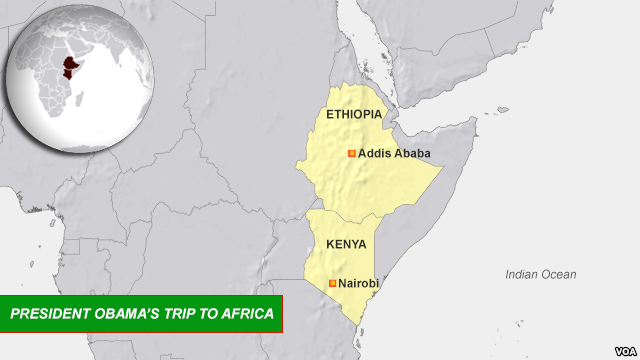VOA News
By Gabe Joselow
Last updated on: July 24, 2015
NAIROBI — U.S. President Barack Obama has arrived in Kenya, amid extremely tight security, for the start of a landmark two-day visit.
Obama touched down in Nairobi Friday evening and was greeted on the tarmac by Kenyan President Uhuru Kenyatta. The U.S. president shook hands with Kenyan dignitaries and signed what appeared to be a guest book before climbing into a limousine.
The streets of Nairobi have been painted and polished as the city has spared no expense to welcome Obama for what Kenyans have called his “homecoming.”
The big headline for the visit is a Global Entrepreneurship Summit — the first time it is being held in Africa. President Obama — as co-host — will address the gathering on Saturday.
Kenya also has special significance for the U.S. president. His father was born and is buried in rural western Kenya and served in the government of Kenya’s first president.
Obama last visited in 2006 as a U.S. senator, but, this is his first trip as president — and that, says Kenyan Deputy President William Ruto, means a lot to his country.
“President Obama is not just any other American president,” Ruto told VOA. “He has African roots, and more specifically Kenyan roots, and so it is significant in a very different way.”
WATCH:: Kenya Rolls Out Red Carpet for President Obama
Video: Voice of America White House correspondent Aru Pande report from Nairobi
Security concerns
While much of the visit will focus on boosting trade, the other big issue on the agenda will be security when Obama meets President Uhuru Kenyatta Saturday.
Kenyan Foreign Secretary Amina Mohamed told VOA it is a common top concern.
“Our collaboration, especially on security, is historic. It’s always been there, but of course we’ve enhanced it a lot in the last few years because of the threat — the global threat actually — that we all face,” Mohamed said.
Kenya has been targeted repeatedly by the Somali militant group al-Shabab. The deadliest attack took place at Garissa University College in April, when 148 people, most of them students, were slaughtered on campus.
Ethiopia stop

After two days in Kenya, Obama will become the first U.S. president to visit Ethiopia.
Ahead of his arrival in Africa, human rights groups urged the president to use his trip to call for fundamental human rights reforms in both countries.
In a letter to Obama, a group of 14 nongovernmental organizations and individual experts said the governments of Kenya and Ethiopia “face real security threats, but we are concerned by the way in which each government has responded, often with abusive security measures and increased efforts to stifle civil society and independent media.”
Trade with Africa
Late Wednesday, President Obama spoke about trade with Africa at a White House reception marking the signing of the African Growth and Opportunity Act. He said despite Africa’s challenges, the continent is a dynamic place with some of the fastest-growing markets in the world. He said it has the potential to be the next center of global economic opportunity.
He said the trade law will continue to encourage good governance, labor rights and human rights in Africa.
Obama last month signed a 10-year extension of the country’s main trade authority with Africa — a 15-year effort that boosted U.S.-Africa trade to $73 billion last year, with U.S. exports accounting for slightly more than half of that total.
More than 40 sub-Saharan countries are eligible for trade benefits under the law, through which most imports from Africa enter the United States duty free. Two of the main beneficiaries are oil exporters Angola and Nigeria.
Even as U.S. trade with Africa has grown rapidly, it trails resource hungry China, now with $200 billion in annual African trade, and the 28-nation European Union with $140 billion.
Obama has made a concerted effort to increase U.S. ties with Africa. Last August, he staged the inaugural U.S.-Africa Leaders Summit in Washington.
The U.S. says the Africa trade measure supports an estimated 350,000 jobs. As the trade extension advanced in Congress, U.S. Trade Representative Michael Froman and National Security Advisor Susan Rice said it has “provided vital economic opportunities,” helping African companies become more competitive and opening the path for more investments in them.
—
Related:
Photos: President Obama Arrives in Kenya
Obama’s Historic Visit to Ethiopia: A Larger Perspective
Obama’s Visit to Africa Draws Fire From Human Rights Groups
President Obama Visits Kenya and Ethiopia
Obama’s Ethiopia visit legitimizes authoritarian government, critical expatriates say
A Conversation on President Obama’s Trip to Kenya and Ethiopia
View more details on Brookings.edu
Open Letter to The Washington Post Regarding Ethiopia
Harassing VOA Reporter is Not Your First Amendment Right
D.C.-area Ethiopians say Obama trip will send wrong signal to repressive regime in homeland
Obama Visit to Ethiopia Brings Fresh Eyes to the Country, Say Seattle Ethiopians
Mr. Obama’s visit to Ethiopia sends the wrong message on democracy (Washington Post)
In Ethiopia, Why Obama Should Give Due Credit to Haile Selassie’s OAU Role
Breaking News: President Obama to Travel to Ethiopia in Late July
Meet the 2015 Mandela Washington Fellows from Ethiopia
Brookings Institution Recommends Obama Visit Kenya, Ethiopia & Nigeria